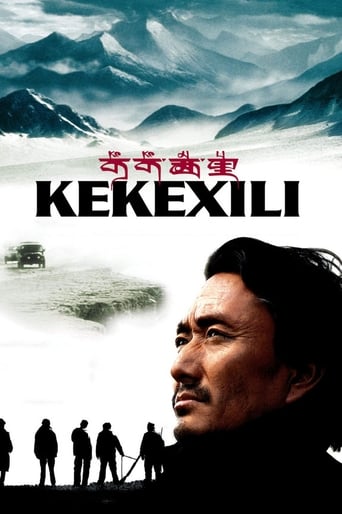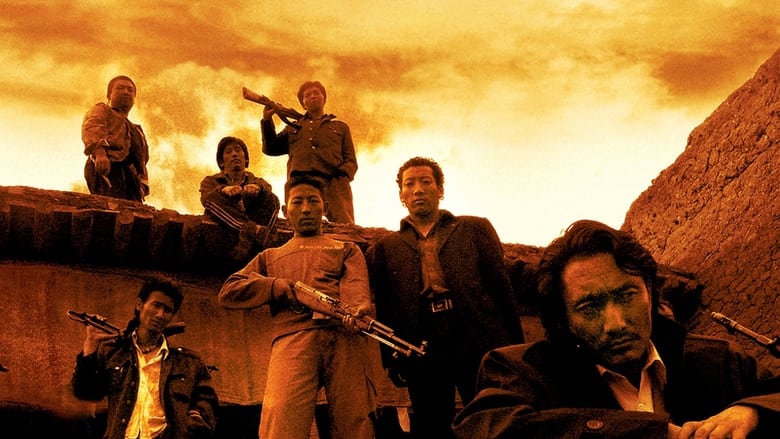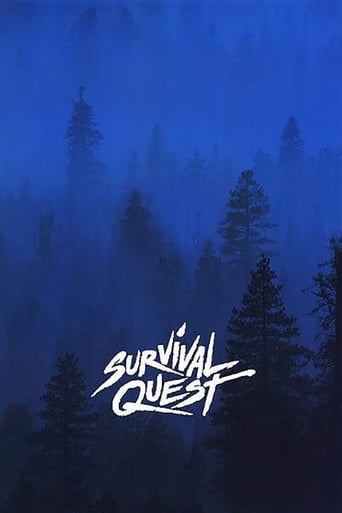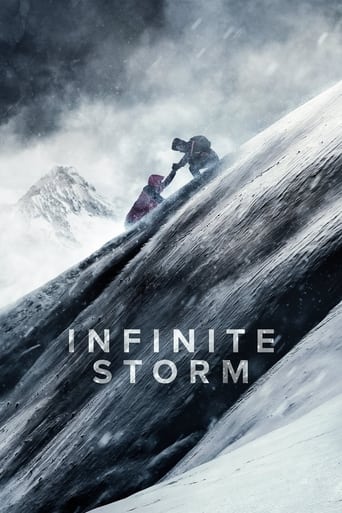Mountain Patrol (2004)
A moving true story about volunteers protecting antelope against poachers in the severe mountains of Tibet.
Watch Trailer
Cast
Similar titles
Reviews
i know i wasted 90 mins of my life.
Brilliant and touching
Great story, amazing characters, superb action, enthralling cinematography. Yes, this is something I am glad I spent money on.
Close shines in drama with strong language, adult themes.
For the record, Kekexili is part of Qinghai Province, not Tibet!There are heaps of Tibetan ethnic minorities in Qinghai Province and Gansu Province.The poachers mostly Hui Muslim from Hualong , Qinghai in which has its reputation for illegally manufacturing guns and give a headache to Chinese government . And the "breathtaking scenery" can be spotted in most provinces in western China (Qinghai, Gansu, Xinjiang,etc.),not only Tibet. Why would some hypocrites always set their mind on Tibet . Spare your worthless prepossession, leave Tibet alone, then you can truly understand this movie. All in all, it is a good movie. Simple, to the point , ruthless.The patrolmen are respectably stupid, yet exactly this Stu**NE*s has made this movie. But i have to say nothing important than human life! Riti is failed as leader and protector, he shouldn't rick bothers life when he clearly know they are outnumbered and ill-equipped. I feel sorry for the human more than animals. People who living in that area living a harsh life that they didn't create in the first place, it is basically desert due to the mother nature. Doesn't matter how you animal protector* thinks, it won't work for this situation as most of the poachers and ski8ners had no choice, they need to survive. The only measure to protect the rare animal in Tibetan plateau is to protect human, improve their living condition! Human- oriented principle is essential. Human there are struggling to survive, people gotta eat. If they can live a life with warmth and fullness, they will leave the animal alone.After all who would want to risk their lives of getting shot for smuggling animal fur?
A different kind of movie about a different kind of people in a different kind of country... Or is it? Absence of music, a depiction of harsh land where death comes for you in a blink of an eye and a portrayal of people who risked everything for "a bunch of antelopes", but unlike Hollywood heroes even they have flaws and same as the poachers they fight against, they all are, at the end of the day, just people like you and me.What I especially like about this movie is the absence of music, unnecessary drama or anything else to spoil the "real-life experience". You will really feel like you actually are inside the car that is falling apart as the patrolmen chase after the poachers as if nothing else mattered. Behaviour of the characters is beliavable and the usage of Tibetan and Chinese according to the situation also might be intriguing to a student of any of those.
The first reviews which drew me to watch Kekexili compared it to the great American "Westerns"-- so I'll start with the DIFFERENCES. To begin with, the Region-1 DVD cover shown here on IMDb is splattered with more red/ blood than you will actually see in the film-- OTOH, the Region-3 DVD cover completely gives away the ending. Talk about cultural differences in marketing strategy-- action/ plot vs. something worthy of repeated viewing?More importantly, American "Westerns" were generally made in 20th century about 18th-19th century, so even the most "gritty and hard-hitting" ones are full of American "romantizations" about a long-gone time and place. OTOH, Kekexili is a 2004 film about something that only happened 10 years ago-- so it is full of the kind of realism that even National Geographic may find hard to achieve (high-altitude cinematography with the sand and the cold cracking the film-stock, getting the locals to talk, etc.).IOW, fans of the American "Westerns" are not going to enjoy this film-- the chase/ action sequences are few, short and slow (you move too fast at high altitudes-- you die) and the patrol-men don't exhibit any modern or western sense of individualism/ heroism that audiences can cheer for. Even fans of the Discovery Channel may not know how to react-- there is very little narration to tell audiences what to think, very little music to tell audiences what to feel and very little slow-motion/panning cinematography for audiences to ogle at.What this film is, is a different kind of "docu-drama" (more Abbas Kiarostami than Akira Kurosawa)-- the kind where the director "pulls all his punches" with such minimalist scripting, plotting, acting, photography and editing, that audiences are denied any possibility of a cheap thrill (the "ah-hah" or "wow" from being given a back-story, message, climax, conclusion, etc.). This is where this film rises above the likes of "Himalaya" which tries to tuck in a conventional but awkward narrative-structure-- in the words of the director, it's very "cruel" to the audiences.I mean, talk about letting the subject-matter "speak for itself"-- it starts out with the premise of some high action-adventure, but continually "breaks" the pace to let the realities of high-altitude patrolling intrude.... And since we are mostly "embedded" with the reporter who speaks only a little Tibetan, very little is explained to us/ the reporter (the patrol-men aren't great "talkers"...). To improve the "immersion" factor or get a sense of the wonder and confusion the reporter felt, try watching the film without the subtitles for the Tibetan dialogue. Like a backpacking/trekking trip, you might have to think about what you saw or felt after you "come back".This film had a limited marketing and release because it didn't quite fit any of the "commercial" film genres-- but I'll be watching out for director Lu Chuan's next film about the Nanjing massacre (or "incident" as some Japanese call it).
Meaning "Beautiful mountains; beautiful maidens" in Tibetan, Kekexili is the relentless, harsh mountainous plateau in China's interior west just at the border of Tibet. Together with the splendorous scenery comes ferocious snowstorms and treacherous quicksand. It's these forces of nature that eventually brought peril to a troop of voluntary mountain patroller in the pursuit of poachers of the near-extinct Tibetan antelopes during the mid 90s.The story of the voluntary mountain patrol is told through a Beijing report who accompanied them through a 10-day quest to track down a band of poachers who kidnapped and murdered one of their men. Led by indefatigable leader Ritai, these volunteers from all walks of life shared a common passion, there fervent love of the lordly Tibetan antelopes and hence their furious hatred of the ruthless poachers. The intensity of this passion is brought home to the audience when they witness a scene of a mountain plain littered by hundreds of carcasses of skinned antelopes in the middle of being picked clean by carrion crows, and later reinforced by a similar scene, with the skin of these antelopes spread out to dry, some with crimson bullet holes.Filmed as a semi-documentary, Kekexili does not portray the patrollers as one-dimensional heroes as some Hollywood flicks might have done. We see them, during their red-hot pursuit, rough-handling a minor offender caught with antelope hair instead of cotton padding his coat and a couple of worm catchers who happened to have witnessed the poacher passing by. But these are minor, as we gradually come to understand that desperate for financial resources, as they were only semi-official and not paid by the provincial government, the mountain patrol resorted to selling some of the pelts they confiscated from the poachers. But the lasting impression left with us of the mountain patrol would be their humanity, their simple zest for life, their comradeship, their self-sacrificing spirit and their absolute dedication to doing what they believe in.Kekexili is a deeply moving account of a true story crying out to be told, and has won awards in Tokyo and Taiwan. It deserves to be seen by the rest of the world.* * * After the first screening of Kekexili in the Hong Kong International Film Festival (22 March to 6 April 2005), young, handsome director Lu Chuan answered questions from the audience in Putonghua and respectably fluent English.He explained that he was moved to making this film after reading the report of the Beijing photojournalist Ga Yu. The film took two years in preparation before filming, and was shot at the exact locations of the actual events. He said that in filming the story of the mountain patrol, he was not trying to provide an answer to what fuelled their devotion, but just to reflect what actually happened. On the minor questions, he explained that the five hundred odd carcasses in the film were not from killing antelopes (yes, that was the question!), but were actually from mountain goats that was the natives' normal food. And yes, he himself did try eating raw meat, as the reporter did in the movie, when offered a leg just cut from a rabbit freshly shot..Breaking of the story by the Beijing reporter brought sensational worldwide reaction. In response, the government took strong measures and formed an official force to stamp out poaching of the antelopes. The voluntary mountain patrol, having thus achieved its goal, was disbanded. The population of the Tibetan antelope has since increased.









